Filter by
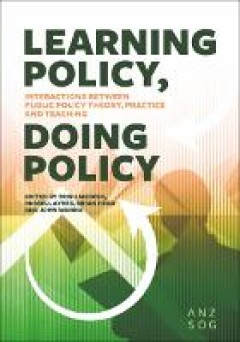
Learning policy, doing policy : interactions between public policy theory, pr…
When it comes to policymaking, public servants have traditionally learned 'on the job', with practical experience and tacit knowledge valued over theory-based learning and academic analysis. Yet increasing numbers of public servants are undertaking policy training through postgraduate qualifications and/or through short courses in policy training. Learning Policy, Doing Policy explores how poli…
- Edition
- -
- ISBN/ISSN
- 9781760464219
- Collation
- XXI, 329 p.
- Series Title
- Australia and New Zealand School of Government (ANZSOG)
- Call Number
- 374.934 LEA l

European elites and ideas of empire, 1917-1957
Who thought of Europe as a community before its economic integration in 1957? Dina Gusejnova illustrates how a supranational European mentality was forged from depleted imperial identities. In the revolutions of 1917 to 1920, the power of the Hohenzollern, Habsburg and Romanoff dynasties over their subjects expired. Even though Germany lost its credit as a world power twice in that century, in …
- Edition
- -
- ISBN/ISSN
- 9781316343050
- Collation
- xlviii, 344p. : ill.
- Series Title
- -
- Call Number
- 325.309409041 GUS e
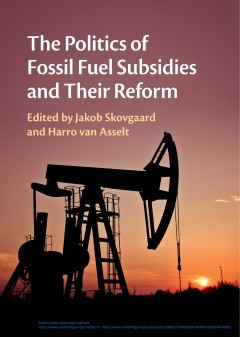
The politics of fossil fuel subsidies and their reform
Fossil fuel subsidies strain public budgets, and contribute to climate change and local air pollution. Despite widespread agreement among experts about the benefits of reforming fossil fuel subsidies, repeated international commitments to eliminate them, and valiant efforts by some countries to reform them, they continue to persist. This book helps explain this conundrum, by exploring the polit…
- Edition
- -
- ISBN/ISSN
- 9781108241946
- Collation
- xxiii, 324p. : ill.
- Series Title
- -
- Call Number
- 338.23 POL p
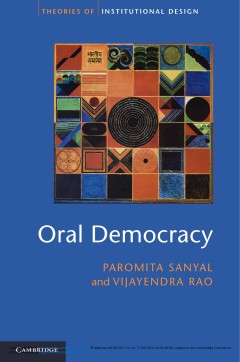
Oral democracy : deliberation in Indian village assemblies
Oral Democracy studies citizens' voices in civic and political deliberations in India's gram sabhas (village assemblies), the largest deliberative institution in human history. It analyses nearly three hundred transcripts of gram sabhas, sampled within the framework of a natural experiment, allowing the authors to study how state policy affects the quality of discourse, citizens' discursive per…
- Edition
- -
- ISBN/ISSN
- 9781139095716
- Collation
- xi, 215p. : ill.
- Series Title
- -
- Call Number
- 320.840954 SAN o
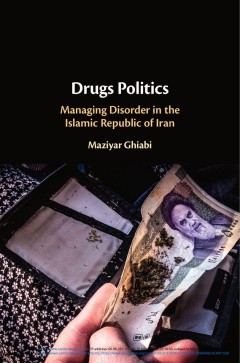
Drugs politics : managing disorder in the Islamic Republic of Iran
Iran has one of the world's highest rates of drug addiction: estimated to be between 2 and 7 percent of the entire population. This makes the questions that this book asks all the more salient: what is the place of illegal substances in the politics of modern Iran? How have drugs affected the formation of the Iranian state and its power dynamics? And how have governmental attempts at controllin…
- Edition
- -
- ISBN/ISSN
- 9781108567084
- Collation
- xix, 343p. : ill.
- Series Title
- -
- Call Number
- 362.2915610955 GHI d
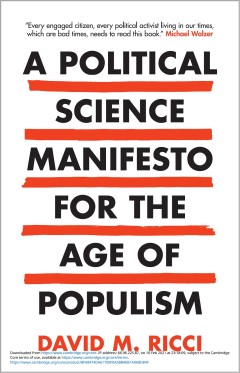
A political science manifesto for the age of populism : challenging growth, m…
Populism and authoritarian-populist parties have surged in the 21st century. In the United States, Donald Trump appears to have become the poster president for the surge. David M. Ricci, in this call to arms, thinks Trump is symptomatic of the changes that have caused a crisis among Americans - namely, mass economic and creative destruction: automation, outsourcing, deindustrialization, globali…
- Edition
- -
- ISBN/ISSN
- 9781108785440
- Collation
- x, 245p. : ill.
- Series Title
- -
- Call Number
- 320.473 RIC p
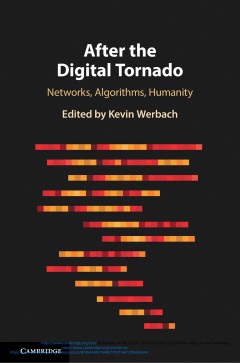
After the digital tornado : networks, algorithms, humanity
Networks powered by algorithms are pervasive. Major contemporary technology trends - Internet of Things, Big Data, Digital Platform Power, Blockchain, and the Algorithmic Society - are manifestations of this phenomenon. The internet, which once seemed an unambiguous benefit to society, is now the basis for invasions of privacy, massive concentrations of power, and wide-scale manipulation. The a…
- Edition
- -
- ISBN/ISSN
- 9781108610018
- Collation
- ix, 239p. : ill.
- Series Title
- -
- Call Number
- 394.334 AFT a

Science and technology governance and ethics : a global perspective from Euro…
This book analyzes the possibilities for effective global governance of science in Europe, India and China. Authors from the three regions join forces to explore how ethical concerns over new technologies can be incorporated into global science and technology policies. The first chapter introduces the topic, offering a global perspective on embedding ethics in science and technology policy. Cha…
- Edition
- -
- ISBN/ISSN
- 9783319146935
- Collation
- viii, 173p. : ill.
- Series Title
- -
- Call Number
- 509 MIL s
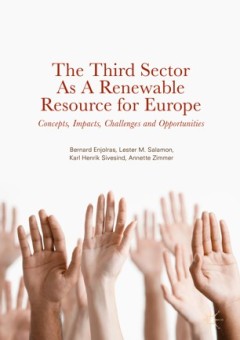
The third sector as a renewable resource for Europe : concepts, impacts, chal…
This book provides a critical account of the third sector and its future in Europe. It offers an original conceptualization of the third sector in its European manifestations alongside an overview of its major contours, including its structure, sources of support, and recent trends. It also assesses the impact of this sector in Europe which considers its contributions to European economic devel…
- Edition
- -
- ISBN/ISSN
- 9783319714738
- Collation
- xv, 196 p.
- Series Title
- -
- Call Number
- 361.61 ENJ t
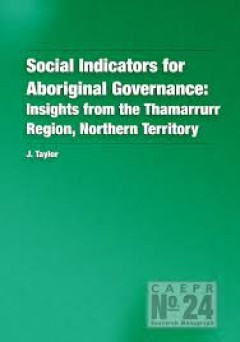
Social Indicators for Aboriginal Governance: Insights from the Thamarrurr Reg…
Thamarrurr is the cornerstone of our society. It is our way of working together, cooper-ating with each other, and it is also the basis of our governance system.In the early days we looked after our families, our clans and our people throughThamarrurr. We arranged ceremonies, marriages, sorted out tribal disputes and manyother things. We were people living as a nation. People livi…
- Edition
- -
- ISBN/ISSN
- 9781920942120
- Collation
- -
- Series Title
- -
- Call Number
- 994.0049915 TAY s
 Computer Science, Information & General Works
Computer Science, Information & General Works  Philosophy & Psychology
Philosophy & Psychology  Religion
Religion  Social Sciences
Social Sciences  Language
Language  Pure Science
Pure Science  Applied Sciences
Applied Sciences  Art & Recreation
Art & Recreation  Literature
Literature  History & Geography
History & Geography